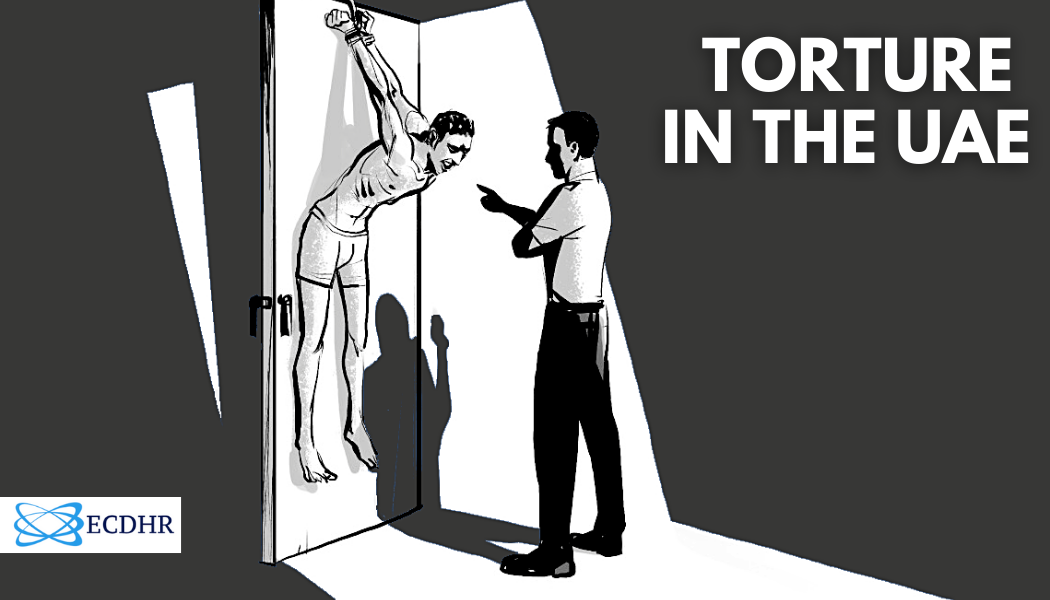To mark the International Day in Support of Victims of Torture, ECDHR takes a look at the United Arab Emirates´ persistent use of torture by the government´s authorities and the substantial culture of impunity of human rights violations.
On the 19th of July 2012, the United Arab Emirates (UAE) ratified the UN Convention against Torture (CAT), thereby committing to respect its guiding principles of torture abolition, torture prevention measures, and prosecution of torture perpetrators. Beyond this, the UAE has integrated the prohibition of torture and ill-treatment within its national laws. Namely, Article 26 of the Emirati Constitution notes that “no man shall be subjected to torture or other indignity,” while Article 28 states that “the physical and mental abuse of an accused person shall be prohibited.” Additionally, the Emirati Penal Code, under Article 242, states that “any public official who uses torture, force or threat against an accused person, a witness or an expert, either directly or indirectly, for the purpose of obtaining a confession to an offence, or coercing the person into making a statement shall be sentenced to a fixed term of imprisonment.” Moreover, the punishments presented in the UAE Penal Code for the crime of torture (between three and 15 years) are inconsistent with the seriousness of the offence committed. That is, the gravity of the offense and the degree of responsibility of the offender are not proportionately dispensed; the punishment is not severe enough. In addition, regarding the sanctioning of ill-treatment as referred to in Article 245, a jail sentence is not systematic but it can be replaced by a fine which, again, is disproportionate to the gravity of the offense.
Some of the most inhuman and degrading practices of torture occur in detention and prison conditions, where individuals´ freedoms are most repressed and they are most vulnerable. Indeed, numerous reports continue to list cases of torture committed by Emirati forces within detention facilities or whilst forcibly disappeared, especially targeting human rights defenders, government critics, and dissidents. Nevertheless, the lack of formal investigations as well as the lack of accountability for the perpetrators continues to be the prominent factor, thereby feeding the already prominent culture of impunity. Some of the methods used for torture include sleep deprivation, beatings, forced standing, verbal threats, sexual assault, and electrocution. Poor conditions of detention further constitute ill-treatment, particularly at state-run rehabilitation facilities, Munasaha centers, provided for under Article 66 of the Antiterrorism Law. Indeed human rights NGOs have received testimonies from UAE activists and human rights defenders who, after completing their prison sentences, have been held indefinitely, without legal basis or charge, in these rehabilitation centers designed for reforming terrorists. Prolonged detention in these centers has been noted to amount to arbitrary deprivation of liberty. Moreover, enforced disappearances are a method of secret detention, where detainees are not officially charged or detained and governments refuse to disclose their whereabouts. The detainees become invisible to the outside world and fall through a legal loophole, putting them at the mercy of their interrogators. Enforced disappearance of peaceful protestors is widely common in the UAE.
In this respect, the UAE 94 was a legally unfair, a mass trial that took place in the UAE in 2013. Ninety-four activists had openly criticized the Emirati government and launched a petition for democratic reform in a dangerous act of political activism. On January 27, 2013, these activists were charged with organizing and administering an organization aimed at overthrowing the government. However, at the trial, many of the detainees such as Mohammed Al-Roken, Khaled Al Nuaimi and Ahmed Al-Suwaidi reported allegations of torture and inhuman treatment in detention and during interrogations to receive forced confessions. Sometimes, the punishment applied to peaceful critics is extended to the whole family. Collective punishment is a form of sanction that punishes individuals or a group of people affiliated with a convicted individual. One of the most common and harmful forms of collective punishment is denaturalization. This practice deprives individuals of their fundamental rights, such as access to healthcare, education and employment opportunities. During the current Covid-19 pandemic, this discrimination against denaturalized individuals has manifested itself in the denial of access to the Covid-19 vaccine. An example of the collective punishment and its extremely damaging consequences is the case of Mohammed al-Siddiq and his family. As a result of his activism in the UAE 94, not only he but his whole family have been victims of the governments´ tools of oppression and torture, suffering from arbitrary revocation of nationality, unfair trials and sentences and refusal of renewing their passports. Likewise, the family members have been continuously threatened with arrest, socially stigmatised and persecuted to this day. Mohammed al-Siddiq is still in prison and his family members have been forced to flee the territory. Indeed, these are just a few examples of numerous cases of victims of repression by the UAE authorities.
To conclude, there is no doubt to state that the UAE´s authorities have failed to stop the systematic use of torture as a weapon of reprisal and control of the society, especially the dissenting voices. For this reason, the ECHR calls for urgent international pressure to end these human rights violations and to hold perpetrators accountable.

